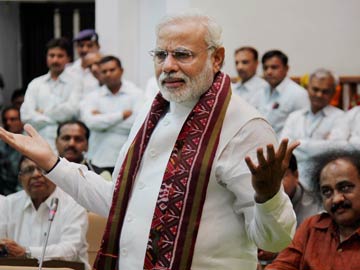Lucknow, Jun 28: Social media and Internet interface may be the buzz words for Prime Minister Narendra Modi but the BJP seems to be caught up in some embarrassing time warp. Its official website's parliamentary sections have no mention of Modi being an MP.
 While there is nothing wrong with the home page - www.bjp.org - the problem lies in the list of Lok Sabha and Rajya Sabha members.
While there is nothing wrong with the home page - www.bjp.org - the problem lies in the list of Lok Sabha and Rajya Sabha members.
Indeed, if this list is to be believed, Modi is not even an MP while deceased leaders like Gopinath Munde and Dilip Singh Judeo represent the party in the Lok Sabha.
A beaming picture of Vidisha MP and External Affairs Minister Sushma Swaraj greets you on the Lok Sabha page - www.bjpinloksabha.com/index.php - as the leader of opposition!
The situation is no better on the Rajya Sabha page (bjpinrajyasabha.org) where now Finance and Defence Minister Arun Jaitley is listed as a mere MP.
Both sites are linked to the BJP's official website.
In the Lok Sabha page, Lalji Tandon is described as the Lucknow MP although the Uttar Pradesh capital is now represented in the Lok Sabha by BJP president Rajnath Singh.
Dilip Singh Judeo, elected to the last Lok Sabha from Bilaspur in Madhya Pradesh and who died in August 2013, figures as a party MP.
Modi's Cabinet colleague Gopinath Munde, who died in a car crash, still figures as the MP from Beed in Maharashtra.
Expelled party leader Jaswant Singh, who rebelled in the run-up to the 16th Lok Sabha election, is listed as the MP from Barmer, a constituency in Rajasthan now represented by Sona Ram, who defected from the Congress.
Modi, who steered the BJP to its highest ever tally in the Lok Sabha, figures nowhere in the Lok Sabha section!
And Murli Manohar Joshi is the MP from Varanasi, which elected Modi to the Lok Sabha.
The Lok Sabha section lists Ramakant Yadav as the MP from Azamgarh, now held by Samajwadi Party chief Mulayam Singh Yadav.
Union minister Maneka Gandhi, an MP from Pilibhit in Uttar Pradesh, is shown as MP from Aonla in Uttar Pradesh - the constituency she represented in the previous Lok Sabha.
Her son Varun Feroze Gandhi is listed as an MP from Pilibhit though he contested and won on the BJP ticket from Sultanpur this time.
Prominent Jharkhand leader and former union finance minister Yashwant Sinha continues to be an MP from Hazaribagh though the seat is now held by by his son, the 51-year-old Jayant Sinha.
Sumita Mahajan, now the Lok Sabha speaker, is listed as a mere MP from Indore in Madhya Pradesh.
Efforts to reach the webmasters and people behind updating the site from here failed.
A Bharatiya Janata Party state leader explained that the bjp.org website home page has a 'Lok Sabha elections 2014' section with names of the new MPs.
"Maybe this is an oversight or negligence. Now that you have alerted us about the issue, it will be corrected soon," the leader told a news agency.





Comments
Add new comment